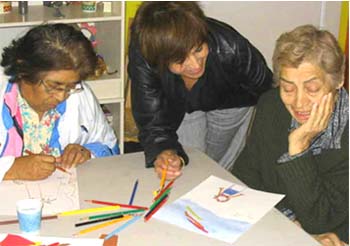CONCERNED ABOUT THE ABUELOS? ..........By Supervisor Greg Cox, County of San Diego and Roberto Velasquez, Vice President, ..........Programs for For every year that passes, the risk of someone who we love becoming affected by dementia and Alzheimer’s disease increases. For many Latino families, the risk of a grandparent, other family member or elderly friend developing dementia may be significantly greater given the prevalence to known or suspected risk factors such as age, education, and vascular disease (including diabetes). South County residents are predominantly Hispanic, making up over 54% of the population in 2008. Although Latinos comprise the largest minority population in South Bay, many people are unaware that Latinos may be at the greatest risk for developing dementia. That is why starting from the month of May, the “Hispanic Alzheimer’s Disease Awareness Month” with funding from the County and the California Endowment, the Alzheimer’s Association start actively working to spread the word about the disease, and providing help, hope and support for the individuals and families affected by Alzheimer’s.
Because of strong family ties, many Latinos in particular find that the disease and its symptoms affect more than just the patient. Families who care for someone with Alzheimer’s disease or dementia can find comfort and support in many of the programs and information offered free of charge in English and Spanish by the Alzheimer’s Association San Diego/Imperial Chapter. The Project enhances the capacity of local health and social service agencies to better serve dementia-affected adults, their families and caregivers by providing them with Alzheimer’s training and cultural sensitivity training. Two agencies, Casa Familiar, Inc. and San Ysidro Health Services, Inc., the principal providers of community-based services to Hispanic elderly in the targeted area, will serve as the 2 primary Focal Point agencies for the Project. Services include case management, information & referrals, diagnostic and health services, support groups, Safe Return, Memories in the Making™ art program, and educational programs. The good news is that there are strategies that people of any age can adopt to keep your brain healthy as you age; and while you can do everything “right” and still not prevent Alzheimer’s disease, the Alzheimer’s Association offers the following tips to help Maintain Your Brain: 1. Head first: Good health starts with your brain. It’s one of the most vital body organs, and it needs care and maintenance. The Alzheimer’s Association San Diego/Imperial Chapter, with funding from The California Endowment, the County, The Parker Foundation, Johnson & Johnson/Society for Arts and Health, and Forest Laboratories, Inc. has implemented a culturally competent and linguistically appropriate “Dementia Care Network” (DCN) in the South Bay region of San Diego County, specifically targeting the Hispanic/Latino community.
|
For more information call 619.428.2877or 1-800 272 39000 Murphy Canyon Road Suite 250 San Diego, CA 92123 |
|
![]()
TEL- 619-427-4111 Email - Health@infooption.com
Salud+HealthInfo is for information and educational purposes only. You should not rely on this information as a substitute for personal medical attention, diagnosis or hands-on treatment. If you are concerned abut your health or that of a child, please consult your family's physician or health provider immediately and do not try to diagnose yourself.
Copyright © 2001-2006 Info Option Network
 info
info the Alzheimer’s Association San Diego/Imperial Chapter
the Alzheimer’s Association San Diego/Imperial Chapter
